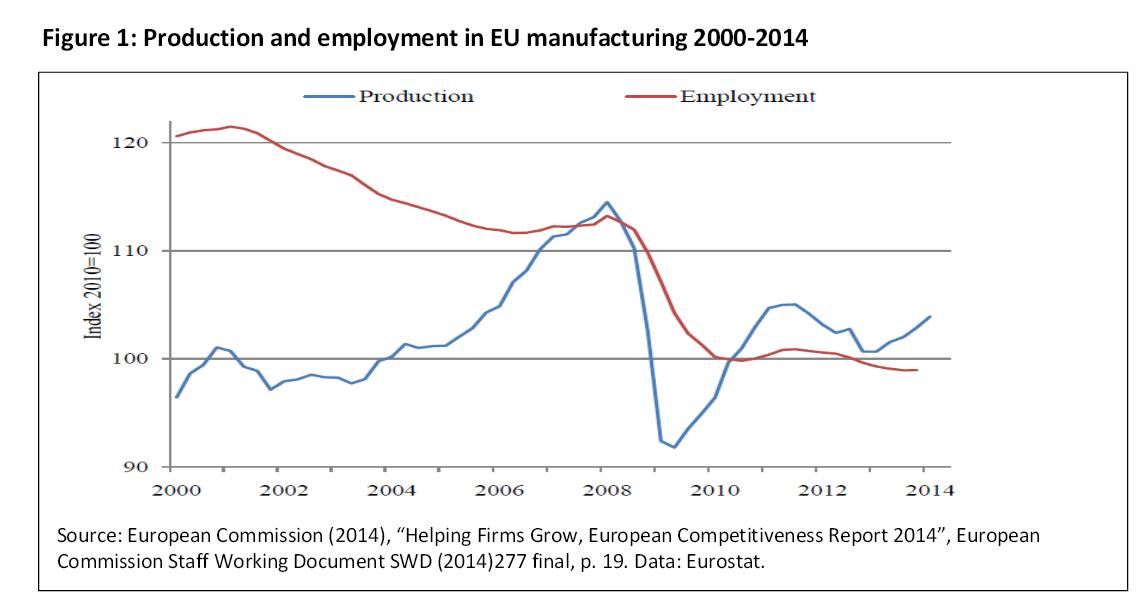Dhéret, C. & Morosi, M. with Andrea Frontini, Annika Hedberg and Romain Pardo (2014) “Towards a New Industrial Policy for Europe“, EPC Issue Paper No. 78, 12 November.
EXECUTIVE SUMMARY
Recent policy debates have confirmed that manufacturing forms a key pillar of the industrial sector and of our economy. However, European manufacturing has been in steady decline for decades. This trend, accelerated by the economic and financial crisis, is certainly part of an overall shift towards the service economy and is also affecting other developed economies, such as the US. But more importantly, it also highlights the structural deficiencies of the European manufacturing industry. In particular, it points out its difficulty in renewal and adaptation to the new global environment and therefore the trouble in maintaining a strong industrial base and a competitive position at the international level. At the same time the economic and financial crisis has shed light on the risks of an excessive reliance on the service and financial sector and the necessity to look for new sources of growth. As a response, this paper argues that fostering a more innovative, knowledge-intensive, new technology-oriented and resource-efficient manufacturing industry in Europe is the right way to go.
In the current context, an ambitious rhetoric has been adopted both at the European and national level with the aim of demonstrating the determination of public authorities to address the issue. Along with the rhetoric, they also launched sweeping action plans to revive the industrial base and reverse off-shoring trends. However, concrete measures undertaken at both governance levels have been inconsistent and weak compared to the magnitude of the challenges faced by European manufacturing as well as the policies implemented by our main competitors.
The relevance and the scope of the issue necessitates a decisive move away from past and current industrial policy thinking and practices, which have shown their limitations. A shift towards a coordinated approach at all levels, i.e. between Member States, across industry, between public and private entities, across all governance levels and the different Directorates-General of the European Commission, is required. This coordination approach should rely on clear objectives, a well-defined strategy and a mandate for the EU to act in the field of industrial policy.
This EPC Issue Paper, which represents the final outcome of the EPC Task Force on ‘A New Industrial Policy for Europe’, provides suggestions to steer the EU in this direction. It contributes to the on-going policy debate on industrial policy and identifies a framework for future actions.
Following the introduction, chapter 2 provides empirical evidence on the deindustrialisation process occurring across Europe and its detrimental effects on the overall economy. Furthermore, it highlights significant divergences in manufacturing performance between Member States which is likely to raise additional challenges for the EU, such as the failure of further economic integration.
Chapter 3 reviews the evolution of the industrial policy thinking over time and the role played by public authorities. Taking a step back in time shows the limitations of past strategies. Therefore, the authors of this paper call for a new and more ambitious strategy articulated around the operationalisation of European cooperation. This cooperation should be based on two guiding principles, i.e. a more collaborative approach between relevant stakeholders and the optimisation of EU strengths.
Lastly, chapter 4 presents a toolkit for the implementation of the new strategic vision and develops a series of policy recommendations. The implementation should be unveiled in a three-stage process.
First, specific requirements, i.e. better and smart regulation, investment in human capital, optimisation of the role of public authorities, and easier access to finance, need to be put in place across the whole EU’s territory in order to prepare the ground for the strategic vision to deploy successfully. Second, the two guiding principles of the operationalisation of European cooperation, i.e. a collaborative approach (1) and the optimisation of EU strengths (2) need to materialise. They include building up a complete industrial ecosystem, implementing the smart specialisation concept, facilitating the emergence of a European value chain, completing the internal energy market and strengthening the external dimension of European growth through actions in trade and economic diplomacy. Finally, enhancing sophistication factors, in particular innovation and the development of new business models, is needed to complete the strategy.
Following this action plan will provide the EU and its Member States with the right tools to strengthen its comparative advantage in global competition. This will therefore secure a better future for manufacturing in Europe.
Relevant posts:
- Wiberg, Μ. (2014) “The political economy of regional policy and industrial location“, VoxEU Organisation, 03 September.
- Giannitsis T., I. Kastelli, 2014, “Industrial policy in times of crisis: the case of Greece” in Teixeira Α.Α.C., E. Silva, R. Paes Mamede (eds.), Structural Change, Competitiveness and Industrial Policy: Painful Lessons from the European Periphery, Routledge, Taylor & Francis Group, London and New York.
- Wolff, Β. G. (2014) “Why Juncker’s industrial goals are unlikely to be achieved“, Bruegel Institute, 16 July.




